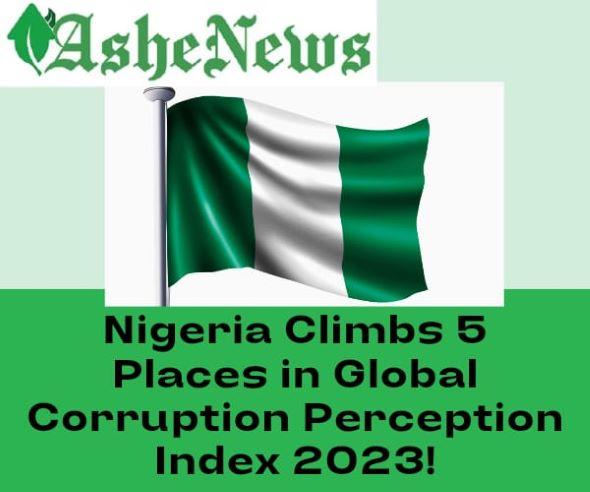The Corruption Perception Index (CPI) of the Transparency International Nigeria, in collaboration with the Civil Society Legislative Advocacy Centre (CISLAC) has showcased advancements by climbing five places in the global rankings for 2023. Released in Abuja on Tuesday, the report indicates a positive shift in the country’s anti-corruption efforts.
Nigeria’s corruption score has seen a marginal improvement, securing the 145th position out of 180 countries, up from the 150th position in the previous year. The gain of five points contributed to Nigeria’s corruption score rising to 25 out of 100 points, compared to the 2022 CPI where the country scored 24 points.
While this upward movement in the global ranking is acknowledged as progress, the Executive Director of CISLAC and head of Transparency International Nigeria, Auwal Rafsanjani, observed that Nigeria’s score still falls below the Sub-Saharan African average of 33 points. Most countries in the region scored below 50, emphasizing the persistent challenge of corruption in the region.
Rafsanjani stressed that sustained efforts are needed to strengthen anti-corruption measures and enhance transparency in public institutions.
He acknowledged Nigeria’s progress as reflective of governmental reforms and initiatives aimed at curbing corruption but also emphasized the need to address systemic issues for more substantial improvements.
The Corruption Perception Index is a vital tool for assessing perceived corruption levels globally, relying on perceptions by country experts and businesspeople. As Nigeria makes strides in the rankings, there is a call for continued dedication to anti-corruption initiatives to foster a culture of transparency and accountability both nationally and internationally.
Key factors contributing to Nigeria’s improvement were outlined, including the launch of the open central register of beneficial ownership in May 2023. This initiative aligns with Nigeria’s commitment at the 2016 Anti-corruption summit in London, indicating a positive stride towards transparency and accountability.
The Head of Anti-Corruption and Human Rights at Premium Times, Ade Adesomoju called for diligent updating of the register and active utilization of derived intelligence by anti-corruption agencies.
“Anti-corruption agencies must actively utilize the intelligence derived from this register, and citizens should be granted unhindered access to foster transparency.”
“The vibrant media, civil society, and citizenry in demanding transparency and accountability, and arrests and recoveries by anti-corruption agencies had contributed to the improvement of the index,” he said.
Despite positive aspects, weaknesses persist, as highlighted by Odeh Friday, Country Director of Accountability Lab Nigeria. Electoral corruption, judicial corruption, Wasteful expenditures, Failure to prosecute high-profile cases and corruption in the security sector continue to be concerns.
“The security situation of the country continues to be a challenge and the corruption in this sector is worrisome because aside from its impacts on the peaceful coexistence of citizens, it also impacts the economy with over 400,000 barrels of crude oil stolen daily as stated by the National Security Adviser Continuous corruption and wasteful expenditures in the security sector are likely to determine the success or failure of the development objectives of the new administration,” Friday said.
The groups emphasized the need for transparent implementation of constituency projects and called for impartial investigations into security sector corruption to address the deteriorating security situation across Nigeria.


